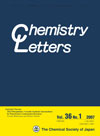We’re sharing a relatively old retraction notice with you today, because it’s of a nature we don’t often see: A chemist apparently stole text from a manuscript he was reviewing.
In spring of 2009, Yi-Chou Tsai, a chemist at National Tsing Hua University in Taiwan, was reviewing a paper for Nature Chemistry. At the time, he’d asked a colleague to write a review article with him, so forwarded him the Nature Chemistry manuscript for reference. But some of that text ended up in their review paper,”Recent Progress in the Chemistry of Quintuple Bonds,” published in Chemistry Letters.
Both papers were published in 2009; Chemistry Letters retracted the review the next year.
The retraction includes a statement from Tsai, who puts the blame on his co-author, Chih-Chieh Chang, also listed as affiliated with NTHU (we couldn’t find a webpage for him):
Unfortunately, he copied some paragraphs from the Nature Chemistry review paper.
Tsai writes:
I am really sorry for this big mistake, which badly hurt Chemistry Letters.
Here’s the full letter, which appeared with a note from the editor of the journal entitled “Sincere Regret:”
On behalf of the Editorial Board of Chemistry Letters, it is with the greatest regret I announce to our Readers that the Highlight Review article of Chem. Lett. Vol. 38, No. 12, pp. 1122-1129, 2009 be retracted.
After we were informed of possible plagiarism from the Chief Editor of Nature Chemistry and received a retraction statement written by the author, Yi-Chou Tsai [above], we engaged in considerable discussion and came to the conclusion that the article should be retracted from Chemistry Letters.
Unfortunately, peer-review of Prof. Tsai’s article had been completed prior to the appearance of the Review in Nature Chemistry, and needless to say no indication of plagiarism was evident at the time.
We are deeply sorry for any offence caused by this matter, and strongly urge the author to take responsibility and make amends for his careless disregard for Chemistry Letters, Nature Chemistry, and our valued readership.
We on the Editorial Board are taking responsibility the ensure that incidents such as this are not repeated. To begin with we are reconsidering our selection criteria for author of Highlight Reviews.
Finally I sincerely thank you for your understanding and again hope you accept our remorse.
Professor Tamejiro Hiyama, Editor-in-Chief Chemistry Letters
The paper has been cited five times, according to Thomson Reuters Web of Knowledge.
Although not common, peer reviewers have stolen text before: Just last month, we reported on a case where a reviewer took material for a ChemElectroChem paper, earning him a retraction and a sanction from the journal.
We’ve reached out to Tsai, and will update this post with anything else we learn.
Hat tip: Stuart Cantrill
Like Retraction Watch? Consider making a tax-deductible contribution to support our growth. You can also follow us on Twitter, like us on Facebook, add us to your RSS reader, sign up on our homepage for an email every time there’s a new post, or subscribe to our new daily digest. Click here to review our Comments Policy.

reviewing a paper for Nature Chemistry. At the time, he’d asked a colleague to write a review article with him, so forwarded him the Nature Chemistry manuscript for reference.
Yi-Chou Tsai’s letter of apology makes it clear that he had recommended the Nature Chemistry review for publication, and presumably knew that it had been accepted, so it is hard to fault him for leaking his pre-publication copy of the manuscript to his colleague. Still, it is unfortunate that he did not recognise paragraphs from the material he’d reviewed, when his colleague copy-pasted them into their own collaboration.
If I steal from the supermarket, and if I should get caught, I will either go to prison, or have to pay a fine. Even if the thief apologizes. So, what will happen to Dr. Tsai?
A peer-reviewer should not pass a manuscript under review to anyone else without the prior permission from the editor. I think Nature Chemistry should take the guy out of its list of reviewers.
This has been made explicit by many, but not all, of the journals I have peer-reviewed for.
So what was the outcome of Tsai and Chang?